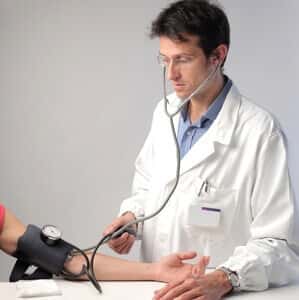
A Canadian study suggests that not everyone who has been diagnosed with hypertension actually has high blood pressure. In fact, perhaps one in five has been misdiagnosed with hypertension and is taking unnecessary medicine to lower blood pressure. That’s because measuring blood pressure is trickier than it looks.
Measuring Blood Pressure Accurately:
The technology for determining blood pressure has improved quite a lot over the last few decades, and machines can be very accurate if they are used properly. But a survey of Canadian family physicians found that more than half of them still measure blood pressure manually, even when the clinic has a machine. To do a good job taking blood pressure, you need about 15 minutes for the patient to be sitting quietly and having several measurements made. But a single manual reading takes a lot less time.
Don’t Be Misdiagnosed with Hypertension:
Ambulatory 24-hour blood pressure measurement is the gold standard for diagnosing hypertension. This means that the person wears a blood pressure cuff for a full day and the device automatically inflates and deflates periodically throughout the day and night. The data are recorded for later analysis. This allows the physician to see how the blood pressure changes over 24 hours, away from the doctor’s office.
As you can imagine, the automated blood pressure device that takes multiple readings is a far more accurate reflection of true blood pressure than a couple of manual readings in a doctor’s office. It has also been our experience that correct procedures for measuring blood pressure are not always followed. Guidelines from the American Heart Association require that the arm be supported at heart level and that the correct-sized cuff be used for each person. Patients should not talk while the reading is happening.
White Coat Angst Leads to Patients Misdiagnosed with Hypertension:
Many health professionals do not appreciate that they can cause anxiety for some patients by merely walking into the exam room. Here are some stories from readers:
Toni in Nigeria writes:
“My bp is always ridiculously high anytime I am at my doctor’s office. In fact, I start having palpitations as soon as he starts putting the cuff on! But at home with my Omron blood pressure monitor I get normal readings. How do I overcome this phobia of my doctor taking my bp?”
Louis in Florida notes:
“In addition to no talking, I have found that no body movement-head, arms, legs and shifting around will result in a more accurate reading, whether at home or in the doctor’s office. The difference between staying silent and not moving can be 10 to 40 points.”
Mary and her doctor came up with a good strategy:
“My blood pressure was always high when I went to the doctor’s office. My doctor, who knew that, took it again before I left the office, and it had invariably gone down considerably.”
Therese in Florida points out some interesting problems:
“For whatever reason, doctors’ offices now have TVs running in the waiting room – sometimes 2 or 3 different sets. Last year I went to the cardiologist with my husband, and the TVs were all set to different news channels. So while waiting to be seen, we got the latest update on the beheadings in the Middle East, what happened in Ferguson, Missouri, the latest stock market slumps with a trailer warning scrolling on the screen about the possibility of a tropical storm headed our way.
“His BP was taken while he sat on the exam table, feet dangling, engaged in a conversation about week-end plans. And the nurse was shocked that his BP was high! What happened to quiet music and magazines to read? Why do we need to be assaulted with TVs blaring bad news? I usually take a book with me or listen to my own music on my Ipod. I don’t understand why a doctor’s office (waiting room) has become a place to be entertained by TV.”
Here’s what we have written previously about measuring blood pressure:
It is important not to be misdiagnosed with hypertension. Accurate measurement of blood pressure is critical to controlling high blood pressure. That in turn can reduce the risk of stroke, heart attack and kidney problems.
Kaczorowski et al, Canadian Family Physician, March 14, 2017

